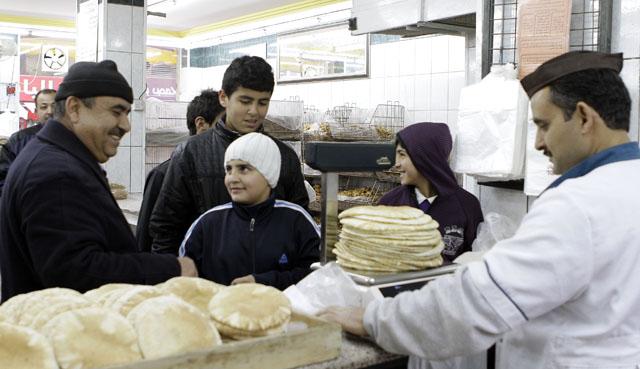You are here
Report casts light on difficult conditions, low income of ‘unorganised’ workers
By JT - Dec 31,2020 - Last updated at Dec 31,2020
AMMAN — A new report by the Phenix Centre for Economic Studies shed light on the hard work and very low income of people who collect dry bread, junk and empty water bottles to help their families make some money.
“Most of these people are described as ‘unorganised’ workers who have no form of social protection, such as social or health insurance, and suffer from very difficult work conditions,” the report noted.
The centre interviewed Um Odai, a woman in her 40s, who at 8am start collecting dry bread from garbage containers in the Wehdat area that she treats and re-sells for very small amounts to take care of her two children.
“I start working at 8am and until 5pm, collecting as much dry bread as possible. It is very tiring and not very rewarding but thank God for everything,” Um Oday told the Phenix Centre.
Um Oday suffers from osteoporosis because of her daily work and yet carries several bags of bread to her house, each weighing 50 kilogrammes, which she sells on the sidewalks of the Wehdat area and to bird shops or farms as animal feed.
Although she carries 15 bags a day, she only makes 25 piasters per bag, totalling only JD3.5 as net income per day, according to the report.
Abu Muhammad, in his 30s, collects the faeces of cattle in farms in Baqa’a area, putting them in large plastic bags and sells them to farmers in the Ghor area as fertiliser for olive trees.
The report highlights how Abu Muhammad suffers from the smell of the faeces and has to carry the bags on his back, working from 6am until dusk, and then having to transport the bags to the Ghor area in Irbid to sell to the farmers.
Abu Muhammad collects 70 large bags every day and sells only half of them the next day because of his inability to carry them all to the Ghor, and charges only 15 to 25 piasters per bag, making only JD5 to JD7 each day, and his work regressed in the winter, causing rent dues to accumulate for him.
“It is very important to include people like Um Oday and Abu Muhammad, whose work is considered unorganised as they work for themselves, in social protection with low subscription prices, as a daily wage worker cannot shoulder 17.5 per cent of what they make deducted for subscription,” the centre quoted labour policy expert Hamada Abu Nijmeh as saying in the report.
Abu Nijmeh said that none of these daily wage workers received any help throughout the crisis, which requires the government and the concerned authorities to create special funds for them from the Social Security Corporation with special measures, aside from the National Aid Fund.
As for their work, he noted that there needs to be some sort of companies or entities, with government or foreign funding, to organise these labourers’ work and help them obtain proper amounts for a better life.
Out of the overall workforce in Jordan, around 48 per cent are under the category of unorganised labourers, 26 per cent of whom work in the private sector, while the remaining 17 per cent work for themselves, Abu Nijmeh concluded.
Related Articles
The Labour Ministry will deal with applications to recruit domestic workers this week, according to its secretary general, Hamadah Abu Nijmeh.
The Jordan Food and Drug Administration (JFDA) plans to ban the use of recycled plastic bags and containers used in direct contact with food items starting next year, an official said on Monday.
AMMAN — The Labour Ministry is working with its partners to create 4,000 job opportunities for women in remote areas and governorates, Labou

















